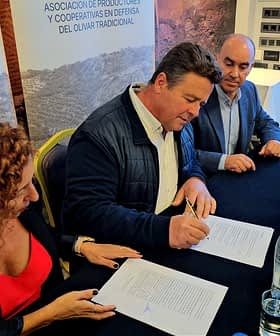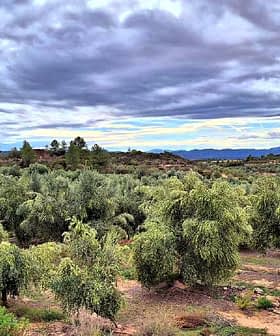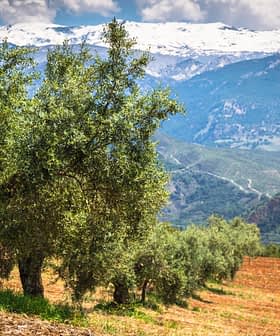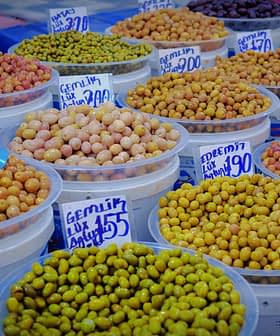Olive Oil Producers and Farmers Across Spain Demand 'Measures of Support'
Farmers across Spain, organized by the main cooperatives and associations, are protesting for better prices and government measures to help ease the burden of increasing production costs.
Hundreds of farmers in Spain’s agriculture sector are protesting for fair prices for products like table olives and olive oil, with prices at “unsustainable” levels; protests have turned violent in some cases, with clashes with police resulting in injuries. Protests organized by UPA, Asaja, and COAG are demanding support to cope with rising production costs, international trade uncertainties, and a recent increase in the national minimum wage, with more protests planned across the country in the coming weeks.
Hundreds from Spain’s agriculture sector are expected to protest across the country over the coming days.
The protestors are demanding fair prices for their products, including table olives and olive oil. Since falling to record-lows last year, olive oil prices have remained at “unsustainable” levels, according to many in the sector.
We can’t wait another day. We have to change things. All those involved should listen loudly and clearly to the voice of the farmers and that is why we will go out to the streets throughout the country.
“Farmers are tired of receiving miserable prices while consumers pay high prices,” Ignacio Huertas, the secretary-general of the Union of Small Farmers and Ranchers (UPA-UCE) in Extremadura, said.
UPA, along with the association of young farmers and ranchers (Asaja) and the Coordinator of Agriculture and Livestock Organizations (COAG) are responsible for organizing the 21 protests that have and will take place.
See Also:Olive Oil Price News“Every day, we [farmers] have more difficulty doing our job and it is a more serious problem than many believe,” Juan Moreno, the director of COAG Extremadura, said.
In addition to low prices, many protestors demand “measures of support” to help them cope with rising costs of production – such as the recent increase of the national minimum wage, which rose by five percent at the beginning of January – and international trade uncertainties being caused by both Brexit and the imposition of tariffs by the United States on numerous Spanish agricultural products in October.
According to Spain’s National Institute of Statistics, the country’s agro-economy also shrank by 2.6 percent in the past year, with the last four months of 2019 also proving to be the worst months for farmers and producers. The decrease comes on the back of growth levels of nearly six percent in 2018.
One of the first of these scheduled protests was held in the western Spanish province of Badajoz on January 29 and descended into violence.
More than 7,000 farmers and ranchers attended the protest, some of whom clashed with police after breaking through a police cordon separating them from the first annual Agroexpo. Spain’s minister of agriculture, fisheries and food, Luis Planas, was among the speakers at the event.
Protestors hurled various objects, including bottles of olive oil, at police before being pushed back. According to the government, 15 were injured in the protests.
The organizers of the protests condemned the violence and blamed various “unrepresentative” factions for inciting the violence.
In response to the incident, Planas also condemned the violence that took place at Agroexpo but extended an olive branch to protestors.
In an interview with local broadcaster, Cadena Ser, he said that “corrective and complementary measures” could be taken to address their concerns regarding the increase in the minimum wage.
Previous protests were held the day before in the autonomous communities of Galicia, Aragón and the Basque Country. Protestors also gathered in La Rioja, Andalusia and Castilla y León on January 29.
On January 30, protestors also gathered in Jaén, blocking roads and highways, to specifically demand fair prices for olive oil producers, which would in turn help maintain the region’s (and country’s) struggling traditional olive groves.
“At the current prices of olive oil in origin (bulk departures from the oil mills), the farmer is making a loss, especially the olive growers registered in the Denominations of Protected Origin, especially producers in Olivar de la Sierra, and those with the highest cost for the production of higher quality oils,” members of the Protected Denominations of Origin Sierra de Segura, Sierra Mágina and Sierra de Cazorla, said.
“Knowing that directly or indirectly the entire province lives from the olive grove, from the PDOs of the province all Jiennenses are encouraged to join the protests,” the members added.
Meanwhile, four other protests, which were attended by at least 7,000 farmers and producers, took place across Castilla y León on the same day.
Further protests are scheduled for the first half of February and will also take place across Spain, including in Cantabría, Castilla-La Mancha, Madrid and Granada.
“We can’t wait another day,” UPA, COAG and Asaja said in a joint statement at the beginning of the protests. “We have to change things. All those involved should listen loudly and clearly to the voice of the farmers and that is why we will go out to the streets throughout the country.”









